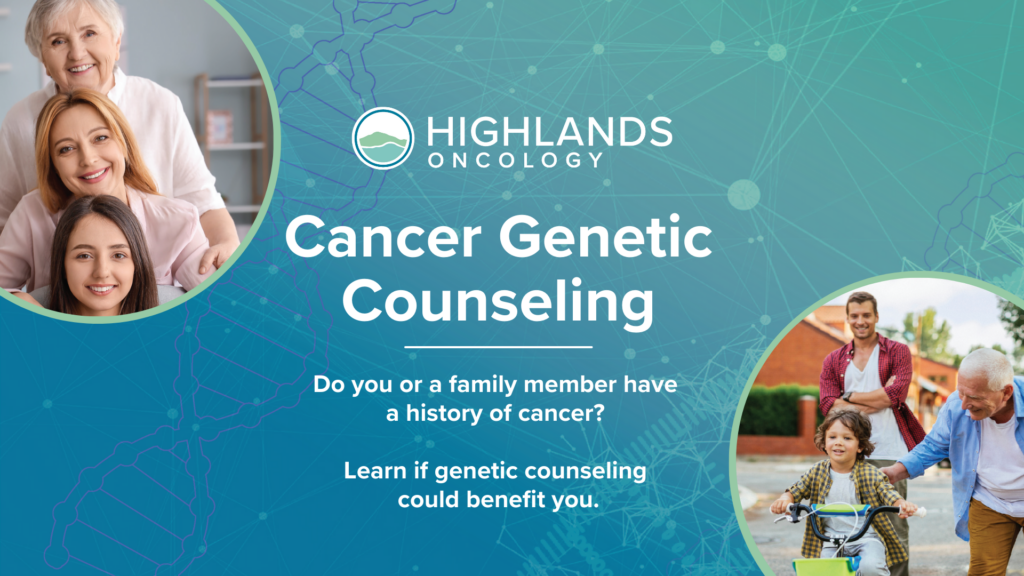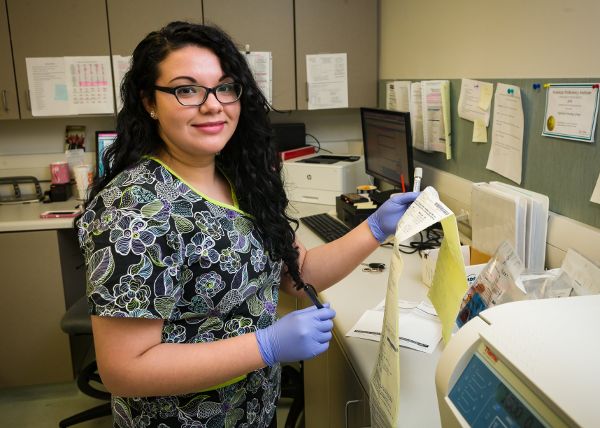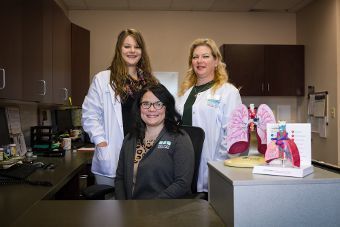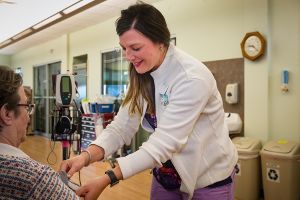
Flyers and Helpful Resources
Genetic Testing Did You Know and Checklist
Genetic Testing for Hereditary Cancer Info Sheet
New Patient Referral Form for Genetic Counseling and CARE Clinic
2025 Genetic Counseling Brochure, Highlands Oncology
What does a cancer genetic counselor do?
All cancers develop because of a combination of chance and other factors. However, in about one out of ten cases, there is also a hereditary cause. Genetic counselors have advanced training in medical genetics and counseling, as well as patient advocacy. A cancer genetic counselor’s role on the healthcare team is to support patients and doctors in many ways, such as:
- Discussing personal and family history of cancer to determine what type of testing may be appropriate.
- Educating on the benefits, risks, and limitations of hereditary cancer testing.
- Helping individuals make testing decisions based on their values and goals.
- Coordinating testing for patients and family members.
- Providing information and resources for clinical management when a hereditary risk of cancer is found
- Identifying individuals who may benefit from extra cancer screenings because of family cancer history.
What happens in a genetic counseling appointment?
Genetic counseling appointments are conversations that incorporate family history, science, and counseling. Your genetic counselor will discuss
- your personal and family medical history with special attention to relatives diagnosed with cancer and their ages at diagnosis,
- how cancer risk can be passed down through the generations of a family,
- whether your family history fits a hereditary cancer syndrome pattern, and
- whether genetic testing could be helpful.
If you decide to have genetic testing, either blood or saliva will be collected and sent to a lab. Results are usually returned in three weeks or less, and your genetic counselor will follow up with you on what they mean and any next steps for you and your family. Whether you choose to have genetic testing or not, your genetic counselor is a resource to you and your family for the long term. This includes determining your risk of developing cancer, how to manage that risk, and the implications for your family members. Appointments can take place in person at either our Rogers or Springdale locations or via telemedicine by phone call or secure video link. Appointments typically last from thirty minutes to an hour.
Who should consider a hereditary cancer evaluation?
Individuals who have a personal or family history of:
- Rare cancer
- Cancer diagnosed at a young age
- Bilateral cancer (cancer in both of a pair of organs, as in both breasts or both kidneys)
- One person diagnosed with two or more cancers in their lifetime (not cancer that has spread from one location to another part of the body)
- Multiple family members diagnosed with cancer, especially across multiple generations
- Ashkenazi Jewish ancestry
- Family history of a known cancer-causing genetic mutation
What are some examples of Hereditary Cancer Syndromes?
There are many hereditary cancer syndromes. As we learn more over time about the complex relationships between genetic changes and risk of cancer, the types of cancers associated and the risk of developing each one can change. Below are a few examples of hereditary cancer syndromes that are commonly assessed with genetic testing. If you feel your family could be affected by a hereditary cancer syndrome, you could consider asking your doctor for a referral to a cancer genetic counselor or referring yourself to one at Highlands Oncology.
Hereditary Breast, Ovarian, and/or Pancreatic Cancer syndrome (formerly Hereditary Breast and Ovarian Cancer (HBOC))
- Caused by mutations in the BRCA1 and BRCA2 genes
- Increased risk of breast, ovarian, pancreatic, and prostate cancers
Lynch syndrome/ Hereditary Non-Polyposis Colorectal Cancer (HNPCC)
- Caused by mutations in the MSH2, MLH1, MSH6, PMS2, and EPCAM genes
- Increased risk of colorectal, uterine, ovarian, stomach, pancreatic, small intestine, urinary tract, brain, central nervous system, and other cancers
Familial Adenomatous Polyposis (FAP)
- Caused by mutations in the APC gene
- Increased risk of widespread colon polyps, desmoid tumors, and cancers of the colon, small intestine, thyroid, stomach, pancreas, liver, and brain/central nervous system
Cowden syndrome/ PTEN Hamartoma Tumor syndrome (PHTS)
- Caused by mutations in the PTEN gene
- Increased risk of breast, colon, uterine, thyroid, melanoma, and kidney cancers
Li-Fraumeni syndrome (LFS)
- Caused by mutations in the TP53 gene
- Increased risk of female breast, brain, sarcoma, leukemia, lymphoma, pancreatic and adrenal gland cancers, as well as cancer in childhood
Neurofibromatosis Type 1 (NF1)
- Caused by mutations in the NF1 gene
- Increased risk of neurofibromas, leukemia, gastrointestinal stromal tumors (GISTs), peripheral nerve sheath tumors, pheochromocytomas, and other and cancers of the brain and breast
If you feel your family could be affected by a hereditary cancer syndrome, you could consider asking your doctor for a referral to a cancer genetic counselor or referring yourself to one at Highlands Oncology.
How can I find a genetic counselor?
If you would like to speak to a genetic counselor in the Northwest Arkansas area, please speak to your physician for a referral to Highlands Oncology Genetic Counseling or call 479-878-7065 to self-refer. We can help locate a genetic counselor elsewhere if needed, or one can be searched at https://www.findageneticcounselor.com/.
For more information talk to your doctor about genetic counseling, call 479-878-7065, or email genetics@hogonc.com.

Don’t let the cost of genetic counseling prevent you from receiving potentially lifesaving information. You can apply for financial assistance by visiting the Oncology Supportive Services website.







